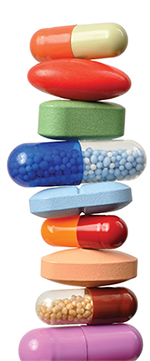
Image Credit: ajt/shutterstock.com
Guselkumab Improves Active Psoriatic Arthritis
New research has revealed that patients with active psoriatic arthritis (PsA) and ≥3% body area of plaque psoriasis benefit from treatment with a human monoclonal antibody known as guselkumab (GUS). GUS is specific for the p19 subunit of interleukin 23 (IL-23). Patients in the Phase 2 clinical trial experienced significant improvement in joint symptoms, physical function, psoriasis, enthesitis, dactylitis and quality of life. Specifically, more than half (58%) of the patients treated with GUS experienced at least a 20% improvement in ACR signs and symptoms of disease (ACR20) at Week 24 compared with 18.4% of placebo-treated patients—the study’s primary endpoint (P<0.001).1
“It is encouraging to see how well patients responded to guselkumab with respect to improvements in signs and symptoms of psoriatic arthritis as early as Week 4 and to see the improvements in health-related quality of life outcomes, such as measures of physical and mental health,” says senior author Atul Deodhar, MD, a rheumatologist at Oregon Health & Science University in Portland, in an email to The Rheumatologist.
Participants in the double-blind, placebo-controlled multicenter study received standard-of-care therapy for PsA, including tumor necrosis factor alpha (TNFα) inhibitors. Despite standard treatment, the participants had at least 3% of their body surface area covered with plaques. The investigators randomized patients (2:1) to receive either 100 mg GUS subcutaneously or placebo at Weeks 0, 4 and every eight weeks thereafter through Week 44. Only four placebo-treated patients (8.2%) and nine GUS-treated patients (9.0%) had previously received TNFα inhibitors.
If patients from either group had less than a 5% improvement from baseline in both tender joint counts and swollen joints at Week 16, they were given the option of early escape to open-label ustekinumab. At Week 24, the remaining placebo patients crossed over to receive 100 mg GUS subcutaneously, given at Week 28 and every eight weeks thereafter through Week 44. The protocol was similar to that used with the initial randomization group.
“We learn something new with each of the studies using targeted biologic therapies,” explains Dr. Deodhar. “We were already aware that therapies that target IL-12 + IL-23 [ustekinumab] and those that target IL-17A were effective in treating psoriatic arthritis, but we did not know if specifically targeting IL-23 would demonstrate the same (or better) efficacy in the signs and symptoms of arthritis, enthesitis and dactylitis. Guselkumab is the first biologic therapy that specifically targets IL-23 that has been studied in PsA.” The results confirm that IL-23 plays a key role in the immunopathogenesis of psoriatic arthritis.

